Working with electricity isn’t a guessing game. Before you touch a wire, switch, or outlet, you need to know one thing for certain: is it live? A reliable voltage tester is the single most important tool for answering that question, making it an absolute essential for any DIYer or professional electrician. It’s the simple device that stands between you and a dangerous electrical shock.
But with different types—from simple pens to complex multimeters—choosing the right one can be confusing. We’ve tested the top models and consulted with the pros to break down exactly what you need. This guide will help you find the perfect voltage tester to keep your projects moving and, most importantly, keep you safe.
Quick Picks: Top Voltage Testers at a Glance
| Model | Best For | Key Feature | Our Rating |
|---|---|---|---|
| Fluke 1AC II | Best Overall | Unmatched Reliability & Safety | ★ 4.9/5 |
| Klein Tools NCVT-1 | Best Value for DIY | Simple, Effective & Affordable | ★ 4.7/5 |
| Fluke T6-1000 Pro | Best for Professionals | Measures Voltage & Current | ★ 4.8/5 |
| Klein Tools NCVT-4IR | Best with Extra Features | Built-in Infrared Thermometer | ★ 4.6/5 |
The Best Voltage Testers: Detailed Reviews
1. Fluke 1AC II Non-Contact Voltage Tester
Best for: Overall Reliability
When it comes to electrical testing, Fluke is the undisputed industry leader, and the 1AC II is a testament to their reputation. This pen tester is incredibly simple and reliable. Its “Voltbeat” technology provides a continuous self-test to ensure it’s always working. When voltage is detected, the tip glows bright red and it emits a loud, clear beep. It’s compact, durable, and the tool most professionals trust in their pocket.
- Be aware of voltage easily - the tip glows red and a beeper sounds when voltage is detected
- Continuous self-test so you always know it’s working
- Voltage detection range for wide application use - 90 V to 1000 V AC or 200 V to 1000 V AC
- Audible/Silent mode for added convenience
- Design: Pen Tester
- Testing Range: 90 to 1,000 volts AC
- Key Features: Continuous Self-Test, Audible & Visual Alerts, CAT IV 1000V Safety Rating
Pros:
- ✅ Industry-leading reputation for safety and accuracy.
- ✅ Continuous self-test gives you confidence it’s working.
- ✅ Clear and loud audible and visual alerts.
- ✅ Automatic shut-off preserves battery life.
Cons:
- ❌ Toggling the beeper off can be tricky.
2. Klein Tools NCVT-1 Non-Contact Voltage Tester
Best for: Homeowners & DIY Value
Klein Tools is another giant in the electrical world, and the NCVT-1 offers professional-grade reliability at a price perfect for any DIYer. It detects AC voltage from 50 to 1,000 volts, providing a bright red visual indicator and a steady audible tone. It’s rugged, simple, and does its one job exceptionally well. For anyone who needs a dependable tester for household projects without breaking the bank, this is the top choice.
- SAFETY FIRST: It will send out multiple alarms through sound and light. When the voltage is detected, the tip will send out red light and beep. When the higher the sensed voltage is, or the closer it is to the voltage source, it beeps at a higher frequency. At the same time, the screen will be red or green, red means high voltage and live wire are detected, green means low voltage and null wire are detected.
- NON-CONTACT: With NCV inductive probe for AC voltage; Just place the tip near a terminal strip, outlet, or supply cord. When the tip glows red and the pen beeps, you know there's voltage present. The live wire detector can automatically detect the live or neutral wire. Ideal for breakpoint Test. Handy circuit tester for electricians, homeowners.
- DUAL RANGE: Detects standard and low voltage (12-1000V AC / 48-1000V AC) for more sensitive and flexible measurements. Press the S button to adjust sensitivity and adapt low range for doorbells, thermostats, irrigation wiring etc.; The NCV sensor automatically recognizes the voltage and displays it on the bar graph.
- SECURITY LEVEL: IEC rated CAT III 1000V CAT IV 600V, Meets CE requirements; The electrical tester is safely double insulated. High Voltage Alert to warn you of voltage above 90V, the screen turn red and the safety symbol on the screen shines.
- COMPACT DESIGN: Bright LED flashlight for work in dim ares; Low-Power-Indicator when battery voltage is below 2.5V; Automatic Power Off after 3 minutes without operation or signal detection; Pocket-sized, pen hook allows you to carry it in your shirt pocket. We provide 36-Month after sale service, Please feel free to contact us if you have any concerns.
- Design: Pen Tester
- Testing Range: 50 to 1,000 volts AC
- Key Features: Simple On/Off, Bright Visual Indicator, Auto Shut-Off
Pros:
- ✅ Excellent value from a trusted brand.
- ✅ Easy-to-understand red light indicator.
- ✅ Durable construction can handle toolbox life.
- ✅ Compact and simple to operate.
Cons:
- ❌ Battery cap can feel less secure than premium models.
3. Sperry Instruments STK001 Voltage Tester Kit
Best for: Best Budget Kit
For those just starting their tool collection, this kit from Sperry Instruments offers unbeatable value. You get both a non-contact pen tester and a plug-in outlet tester for the price of a single tool from other brands. The pen tester detects voltage from 50 to 1,000 volts, while the outlet tester instantly checks for common wiring faults like reversed polarity or open grounds. It’s the perfect, affordable starter pack for home electrical safety.
- Patented, snap-in leads are spaced to fit a standard outlet for easy one-hand testing
- Compact ergonomic design with soft grips for comfort
- Hi-Visibility voltage indication
- Tests for voltage within 4 ranges from 80-480V AC/DC - UL Listed
- Durable heavy-duty design with over-molded rubber grips and a pocket clip
- Design: Pen & Outlet Tester Kit
- Testing Range: 50 to 1,000 volts AC (Pen)
- Key Features: Two tools included, Outlet tester diagnoses wiring faults, Visual and audible alerts
Pros:
- ✅ Incredible value with two essential testers.
- ✅ Outlet tester provides more diagnostic info than a pen.
- ✅ Simple operation for beginners.
Cons:
- ❌ Pen tester can occasionally give false positive readings.
4. Fluke T6-1000 Pro Electrical Tester
Best for: Professionals & Advanced Users
The Fluke T6-1000 Pro is more than just a voltage tester; it’s a revolutionary diagnostic tool. Using its open-fork design and “FieldSense” technology, it can measure AC voltage, current, and frequency without making contact with a live wire—you just slide the wire into the fork. It also functions as a standard multimeter with leads for more precise measurements. For electricians and serious enthusiasts who need comprehensive data, this tool is in a class of its own.
- Safety—Measure AC voltage, current, frequency without touching a live wire
- Faster answers—Troubleshoot with all power supply measurements at-a-glance
- More information—See AC voltage and current values at the same time
- Works where you need it—Fork fits over wires up to AWG 4/0 (120 mm2) with a 17.8 mm (0.7 inch) jaw opening
- Accurate on complex signals—True-rms measurements improve accuracy on non-linear loads
- Design: Open-Fork Multimeter
- Testing Range: Up to 1,000 volts AC/DC
- Key Features: FieldSense Technology, Measures Voltage & Current Simultaneously, Backlit Display
Pros:
- ✅ Measures voltage without test leads touching live conductors.
- ✅ All-in-one multimeter functionality.
- ✅ Saves significant time on the job site.
- ✅ Includes holster and high-quality leads.
Cons:
- ❌ Much more expensive than simple testers.
- ❌ Non-contact readings can be slightly less precise than direct lead contact.
5. Klein Tools NCVT-4IR Non-Contact Voltage Tester
Best for: HVAC & Industrial Use
This Klein Tools model is a problem-solver. It combines a versatile voltage tester (detecting down to 12V for low-voltage systems) with a built-in infrared (IR) thermometer. This is ideal for HVAC technicians or anyone working on equipment that generates heat, allowing you to check for live wires and spot temperature issues with a single tool. Its IP54 rating also means it’s resistant to dust and water, making it perfect for tough job sites.
- Voltage Tester designed specifically for HVAC applications
- Non-Contact Voltage Tester provides non-contact determination of AC voltage in cables, cords, circuit breakers, switches, outlets and wires, and AC voltage in security, entertainment, communications, environmental control, and irrigation systems
- Detects AC voltage from 12 to 1000V with visual and audible indicators
- 4:1 distance-to-spot ratio IR thermometer with user selectable Degrees Fahrenheit or Degrees Celsius from -22 to 482-Degree Fahrenheit (-30 to 250-Degree Celsius)
- Convenient laser pointer to target measurement area for temperature measurement
- Design: Pen Tester with IR Thermometer
- Testing Range: 12 to 1,000 volts AC
- Key Features: Built-in IR Thermometer (-22 to 482°F), Low-Voltage Detection, IP54 Dust/Water Resistance
Pros:
- ✅ Dual-purpose tool saves space in your bag.
- ✅ Wide voltage range is great for thermostats and other low-voltage circuits.
- ✅ Durable and weather-resistant design.
Cons:
- ❌ Slightly bulkier than standard pen testers.
6. Greenlee GT-11 Non-Contact Voltage Detector
Best for: Use in Dark Spaces
Working inside a dark electrical panel or a poorly-lit basement can be challenging. The Greenlee GT-11 addresses this with a bright, built-in flashlight to illuminate your work area. It reliably detects AC voltage from 50 to 1,000 volts and uses a clear flashing red LED and beeper to signal a live circuit. The comfortable, rubberized grip and simple operation make it a solid and practical choice for any toolkit.
- NON-CONTACT VOLTAGE DETECTOR: Tests and accurately detects voltage in outlets, lighting fixtures, power wiring, cables, and circuit breakers with audible and visual alerts
- SAFE AND EFFICIENT TESTING: Non-contact design allows you to safely detect AC voltage from 50V to 1000V AC, and it has a frequency rating of 50/60Hz
- INNOVATIVE SELF-TEST TECHNOLOGY: Patented automatic self-test verifies circuit integrity for maximum convenience and efficiency on the job
- BRIGHT FLASHLIGHT: Features a bright flashlight to help you see better during receptacle testing in dark work areas
- BATTERY POWERED: Includes 2 1.5V AAA batteries for use and automatically turns off after 5 minutes of inactivity to conserve battery life
- Design: Pen Tester with Flashlight
- Testing Range: 50 to 1,000 volts AC
- Key Features: Built-in LED Flashlight, Rubberized Grip, Auto Shut-Off
Pros:
- ✅ Integrated flashlight is genuinely useful.
- ✅ Comfortable and secure grip.
- ✅ Clear flashing red indicator for safety.
Cons:
- ❌ Flashlight isn’t as powerful as a dedicated headlamp.
How to Choose the Right Voltage Tester: A Buyer’s Guide
1. Types of Testers
- Pen Testers (NCVT): The most common type. They are compact, easy to use, and detect voltage without touching a bare wire. Simply touch the tip to an outlet or the insulation of a wire. Ideal for quick, safe checks.
- Outlet Testers: These plug directly into an outlet to check for voltage and diagnose common wiring problems like open grounds or reversed polarity. They are specialized but very effective.
- Multimeters: The most versatile tool. They test both AC and DC voltage with high accuracy using leads. They can also measure current, resistance, and more. A must-have for electronics repair and complex diagnostics.
2. Voltage Range & Compatibility
Most testers handle standard household voltage (90-1000V AC). However, if you work on low-voltage systems like doorbells, thermostats, or irrigation, you’ll need a tester that can detect voltage as low as 12V, like the Klein NCVT-4IR. For automotive work, you need a multimeter capable of testing DC voltage.
3. Safety Rating (CAT)
This is critical. The CAT rating indicates the level of overvoltage protection a tester provides.
- CAT III: Rated for distribution-level wiring, including commercial lighting and main electrical panels.
- CAT IV: The highest rating, for use at the source of the installation (e.g., outdoor lines, service entrance).
For general home use, a CAT III 600V rating is good. For professional work, look for CAT III 1000V or CAT IV 600V.
4. Extra Features
Consider features that suit your work. A built-in flashlight is always helpful. An audible beep provides a secondary alert. And features like an IR thermometer can add significant diagnostic capability for specific trades.
Safety First: How to Use a Voltage Tester Correctly
⚠️ ALWAYS TEST YOUR TESTER! Before and after testing a circuit you think is off, always verify your tester is working by checking it on a known live source, like a working outlet. This is known as “Live-Dead-Live” and is a critical safety habit.
- Never Touch Metal Probes: When using a multimeter, never let your fingers touch the metal tips of the probes.
- Wear Proper Gear: For any serious electrical work, wear safety glasses and consider insulated gloves.
- Assume Wires are Live: Treat every circuit as if it’s live until you have proven it’s dead with your tester.
Frequently Asked Questions (FAQ)
What is a voltage tester and why do I need one?
A voltage tester is a tool that detects the presence of electrical voltage. You need one to safely confirm that a circuit is de-energized (turned off) before you begin any electrical work, preventing shocks and injury.
Can I use a voltage tester for automotive electrical work?
Most standard pen testers are for AC voltage only. Cars use a DC system. To work on automotive wiring, you must use a multimeter that is rated for DC voltage.
What is the importance of an automatic shut-off feature?
Automatic shut-off turns the tester off after a period of inactivity (usually 5-15 minutes). This is a crucial feature that conserves battery life, ensuring your tester is ready to go when you need it.
Are pen testers sufficient for basic household electrical work?
Absolutely. For tasks like confirming power to outlets, light switches, and fixtures, a non-contact voltage tester (pen tester) is the perfect tool. It’s fast, safe, and easy to use.
Conclusion: The Right Tool for a Critical Job
Choosing the best voltage tester is a small investment in your most important asset: your safety. For its unmatched reliability and professional-grade safety features, the Fluke 1AC II is our top recommendation for anyone who takes electrical work seriously. For homeowners and casual DIYers, the Klein Tools NCVT-1 offers fantastic, no-frills performance at a great price.
Get the right tool, test it every time, and you can approach your next electrical project with the confidence that comes from knowing, not guessing.
Updated: October 13, 2025

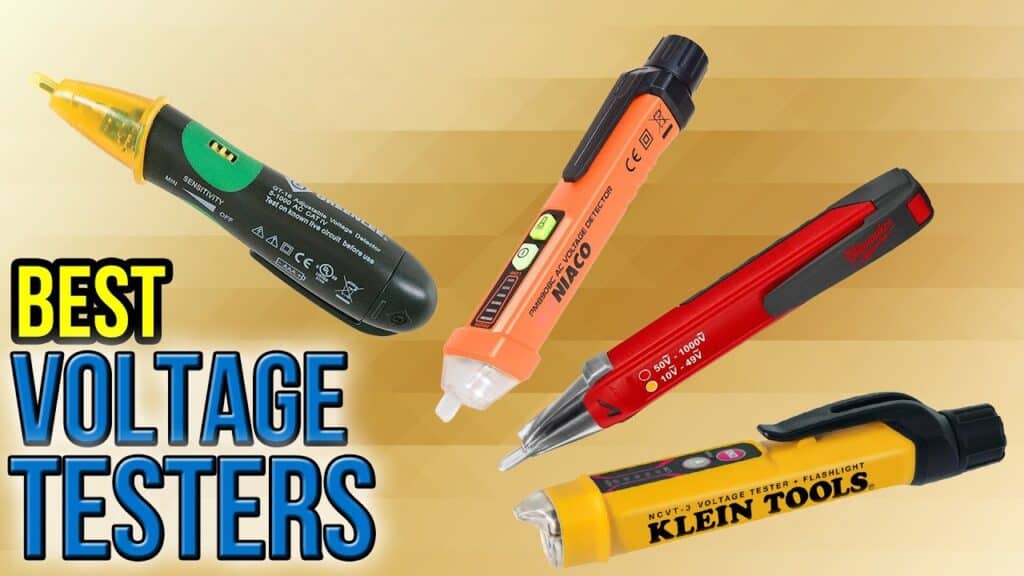






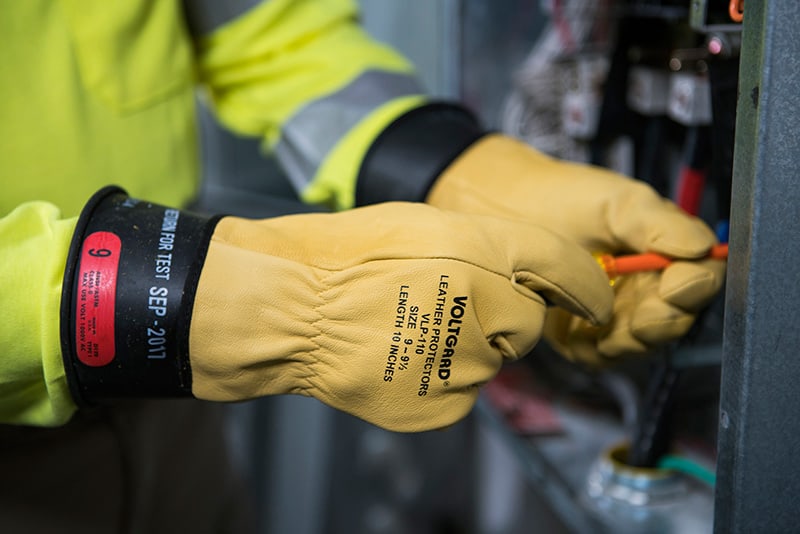
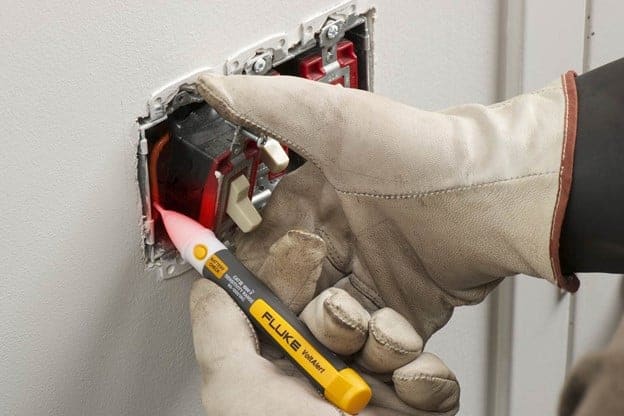

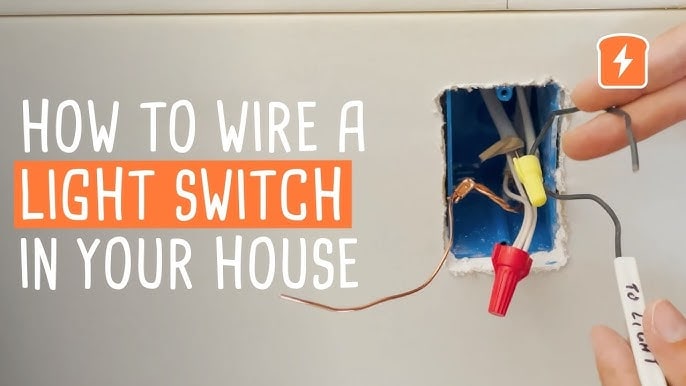




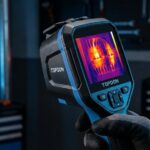
1 thought on “Best Voltage Tester”